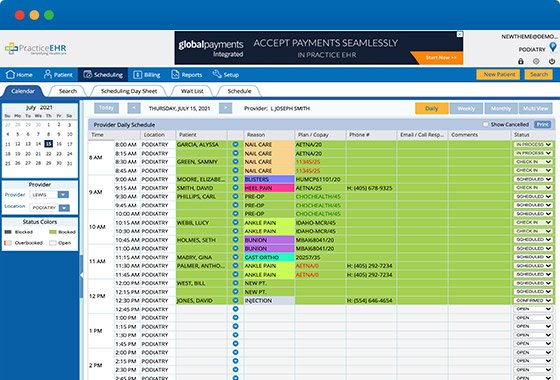Effectiveness in Motion: How Practice Management Software Enhances Patient Care

Within the current rapid healthcare landscape, efficiency is crucial. As medical facilities strive to provide high-quality care while managing operational obstacles, the implementation of practice management software has emerged as a revolutionary tool. This cutting-edge technology streamlines various administrative tasks, allowing healthcare providers to focus more on patient care rather than paperwork.
With practice management software, practices can refine their workflows, minimize errors, and boost communication. Through automating scheduling, billing, and record-keeping, healthcare professionals can guarantee that their time is dedicated on what truly matters: caring for patients. As we explore the ways in which practice management software transforms healthcare delivery, we will uncover its crucial role in fostering an efficient, patient-centered environment.
Optimizing Administrative Tasks
Managing the myriad of office duties in a healthcare environment can be a challenging challenge. Practice management solutions plays a key role in alleviating this burden by automating routine processes. This streamlining allows medical providers to focus more on clinical care rather than becoming mired by documentation and calendar problems. With tools like web-based appointment booking and electronic patient records, practices can smoothly manage their daily operations without sacrificing standards.
Furthermore, practice management software centralizes patient information, making it easily accessible for healthcare staff. This centralization reduces the redundancy of data entry and diminishes the chances of errors that can arise from handling multiple systems. When every piece of information from insurance information to medical history is accessible in one place, medical providers can make faster, informed decisions that lead to superior patient outcomes.
Additionally, by streamlining billing and insurance claim processes, clinical management solutions significantly enhances revenue cycle management. Electronic billing systems reduce the duration spent on billing and tracking payments. This effectiveness not only improves cash flow for the practice but also enhances the overall patient experience, as patients receive prompt and precise billing details. Ultimately, medicloudmed.ch of healthcare management software transforms office tasks from a source of anxiety into a efficient part of healthcare delivery.
Improving Client Engagement
Healthcare management software plays a key role in improving patient interaction by offering a range of tools that enhance interaction between healthcare providers and users. Elements such as safe communication platforms enable patients to readily connect to their healthcare professionals with questions or problems, promoting a more interactive relationship. This immediacy in communication can lead to increased client satisfaction as patients feel more engaged in their own healthcare journey.
Moreover, the system often includes patient dashboards where individuals can retrieve their health files, book visits, and receive notifications about upcoming visits or evaluations. By allowing clients with easy access to their health information, practice management software promotes them to take an engaged role in their care. This not only boosts adherence to care strategies but also cultivates a feeling of accountability and devotion to their care.
Additionally, by using analytics provided by practice management software, medical professionals can monitor user contacts and engagement levels. This insight allows for personalized interaction methods, which can also enhance client engagement. For example, providers can spot patients who may be at threat of dropping off of care and connect actively, ensuring they stay informed and cognizant about their medical options.
Optimizing Data Management and Reporting Processes
Practice management software plays a vital role in revolutionizing how healthcare providers manage and document patient data. With a centralized platform for keeping patient information, practices can quickly access and update records, confirming that data remains precise and up-to-date. This streamlined access helps reduce the risk of errors that can occur when relying on paper records or inconsistent systems, ultimately fostering a more productive workflow.
In addition, practice management software enhances reporting capabilities by allowing healthcare providers to create detailed reports with just a few clicks. This capability enables clinics to monitor various metrics, including patient outcomes, billing efficiency, and appointment schedules. These insights help practices recognize patterns and areas for improvement, allowing for targeted measures that can enhance not only patient care and workflow efficiency.

Moreover, the software often syncs with other healthcare tools, enabling smooth data sharing and reporting. This interoperability ensures that all team members, including physicians, nurses, and administrative staff, have access to the identical accurate information. As a result, collaborative care becomes more attainable, and healthcare delivery enhances considerably. By enhancing data management and data reporting, practice management software enables healthcare providers to provide superior patient outcomes.
